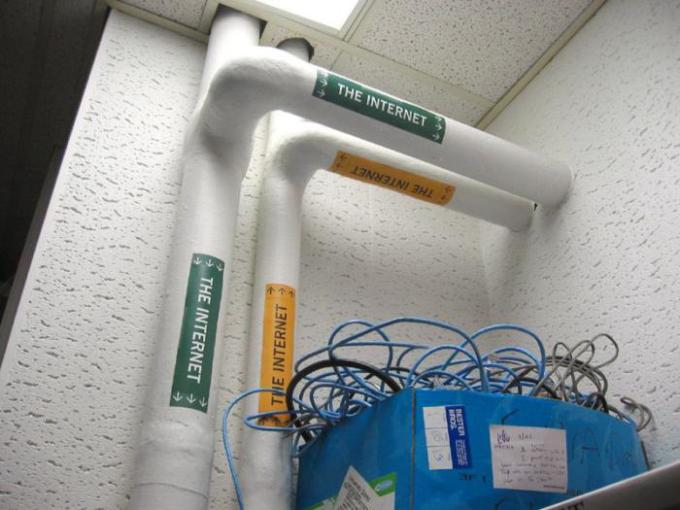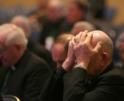
In Depth
Some complain that government wants to regulate the Internet. It's not the content the government wants to regulate. Instead, the government is weighing whether to regulate the companies who threaten to dominate the Internet with their monopolistic practices.
WASHINGTON (CNS) -- Imagine being able to use your television like a computer, in pretty much the same way smartphones have computing capabilities.
Now imagine that you want to give generously during the annual Muscular Dystrophy Telethon. Sure, the phone number is on the screen, but so is the website. And you can make a donation without even having to look away from the screen.
Except that you are limited to a $10 donation. You wonder why this is.
It's happened with smartphones, and in a potentially brave new world of TV viewing, there's no reason to believe that it wouldn't happen with your TV.
Mobile phone carriers have made a business decision to max out a user's donation in response to text-message appeals at 10 bucks because it's their belief a customer doesn't want to see a charge any greater than that on their cellphone bill, according to Cheryl Leanza, director of the Office of Communication for the United Church of Christ. The office is that denomination's media justice ministry.
The United Church of Christ and the U.S. Conference of Catholic Bishops co-sponsored a July 29 program on what's at stake for people of faith and their respective churches in the ongoing discussions about net neutrality and an open Internet.
One of the major tenets of net neutrality -- short for "network neutrality" -- is treating all Internet traffic the same, a principle many Catholic and other faith groups support because it means churches and religious groups have equal access to a mass medium to communicate their messages.
Just as TV has migrated to the Internet, as evidenced by Netflix and Hulu, the opposite could just as easily come to pass. The donations cap described by Leanza serves to illustrate how communications companies can position themselves as gatekeepers of data.
In a past era, there were a relative handful of gatekeepers -- Hollywood movie studios, radio stations, TV networks and later cable channels -- that decided what audiences would see. With the Internet, though, anyone can be their own programmer and create their own content.
Before 2005, the Federal Communications Commission regulated Internet service providers as "common carriers" because the only companies providing Internet connections were phone companies. But that turned out to be less and less true as time went on, and the FCC felt uncomfortable about regulating such corporations that weren't phone companies in that way.
This has led the FCC to its current dilemma. What had been primarily a cable TV company, Comcast, is now offering phone service and has gobbled up content in the form of Universal Pictures, the NBC network and NBC's assorted cable holdings. How is such a corporation with so many varied components to be regulated?
On top of that, Netflix paid Comcast a bundle of money to allow its content to arrive at subscribers' computers faster than the rest of the Internet. Meanwhile, Comcast's prime competitor, Verizon, has been accused by Netflix of deliberately slowing down its traffic. This suggests the shenanigans of a dozen years ago when Internet service providers started blocking services like BitTorrent and Napster on suspicion of trafficking in copyrighted material. In this case, though, Netflix owns the rights to the content they stream.
Where does that leave people of faith? For one thing, according to Leanza, there's a "bad incentive" for customers to pay more for faster Internet speeds if they think their current plans is too balky. And for the churches themselves? None of them has a bankroll like Netflix. Having been virtually shut out from TV, cable, radio and print, if the Internet puts up toll-booth slowdowns and roadblocks to their content, where else is left for them to go?
"Unfettered access to the Internet is as essential and necessary for Americans as is access to education, health care and other services that allow us to flourish and make positive contributions to American society," said USCCB Secretary of Communications Helen Osman in a July 30 email to Catholic News Service.
"Likewise, community-serving organizations -- such as the church -- should not be treated as secondary 'customers' in this digital environment," Osman added. "The content and connections we provide to people could be seen as more important than entertainment content -- such as movies and television shows -- even though we don't have the resources to pay more to the Internet providers."
Some complain that government wants to regulate the Internet. It's not the content the government wants to regulate. Instead, the government is weighing whether to regulate the companies who threaten to dominate the Internet with their monopolistic practices.
Just as government should not be censoring speech, neither should Internet companies. And for those who think that the Internet would lead to a digital wild, wild West of child pornography and other such material, keep in mind that anything illegal then is still illegal and will continue to be illegal, regardless of the delivery method.
The government has regulated those companies in the past. Should it do so again? More than 1 million comments poured into the FCC in advance of hearings scheduled for later this year on the subject, with the vast majority saying yes.
Some suggest that the Internet be treated as a public utility -- just as cable, electric and gas companies enjoy monopoly status in their respective jurisdictions in exchange for government say-so over rates and other terms of service.
Others have gone so far as to say that Internet access is a civil right -- even a human right -- maintaining that the poor cannot be further marginalized as a result of Internet service providers' pricing policies, terms of service and other business practices.
- - -
Pattison is media editor for Catholic News Service.
Recent articles in the In Depth section
-
USCCB meeting: What just happened, and what might happen next?JD Flynn
-
Synodality and sexuality: What the youth synod document said and didn't sayEd Condon
-
Along the 2,000-mile border, few things are black and white Rhina Guidos
-
What went wrong in the Sexual Revolution? New documentary takes a lookLizzy Joslyn
-
Does God make people gay? A theologian respondsMary Rezac Catholic News Agency


















